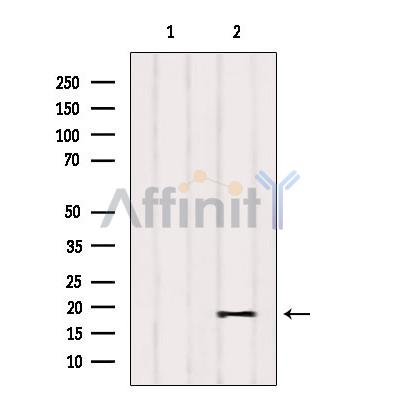PIGP Antibody - #DF9744
製品説明
*The optimal dilutions should be determined by the end user. For optimal experimental results, antibody reuse is not recommended.
*Tips:
WB: For western blot detection of denatured protein samples. IHC: For immunohistochemical detection of paraffin sections (IHC-p) or frozen sections (IHC-f) of tissue samples. IF/ICC: For immunofluorescence detection of cell samples. ELISA(peptide): For ELISA detection of antigenic peptide.
引用形式: Affinity Biosciences Cat# DF9744, RRID:AB_2842939.
折りたたみ/展開
DCRC; DCRC S; Down syndrome critical region gene 5; Down syndrome critical region protein 5; Down syndrome critical region protein C; DSCR 5; DSCR5; DSCRC; DSRC; Phosphatidylinositol glycan anchor biosynthesis class P; Phosphatidylinositol glycan biosynthesis class P; Phosphatidylinositol glycan biosynthesis class P protein; Phosphatidylinositol glycan class P; Phosphatidylinositol n acetylglucosaminyltranferase subunit; Phosphatidylinositol N acetylglucosaminyltransferase subunit P; Phosphatidylinositol N-acetylglucosaminyltransferase subunit P; Phosphatidylinositol-glycan biosynthesis class P protein; PIG-P; PIGP; PIGP_HUMAN;
免疫原
A synthesized peptide derived from human PIGP, corresponding to a region within the internal amino acids.
- P57054 PIGP_HUMAN:
- Protein BLAST With
- NCBI/
- ExPASy/
- Uniprot
MVPRSTSLTLIVFLFHRLSKAPGKMVENSPSPLPERAIYGFVLFLSSQFGFILYLVWAFIPESWLNSLGLTYWPQKYWAVALPVYLLIAIVIGYVLLFGINMMSTSPLDSIHTITDNYAKNQQQKKYQEEAIPALRDISISEVNQMFFLAAKELYTKN
種類予測
Score>80(red) has high confidence and is suggested to be used for WB detection. *The prediction model is mainly based on the alignment of immunogen sequences, the results are for reference only, not as the basis of quality assurance.
High(score>80) Medium(80>score>50) Low(score<50) No confidence
研究背景
Part of the complex catalyzing the transfer of N-acetylglucosamine from UDP-N-acetylglucosamine to phosphatidylinositol, the first step of GPI biosynthesis.
Membrane>Multi-pass membrane protein.
Ubiquitous.
Belongs to the PIGP family.
研究領域
· Metabolism > Glycan biosynthesis and metabolism > Glycosylphosphatidylinositol (GPI)-anchor biosynthesis.
· Metabolism > Global and overview maps > Metabolic pathways.
Restrictive clause
Affinity Biosciences tests all products strictly. Citations are provided as a resource for additional applications that have not been validated by Affinity Biosciences. Please choose the appropriate format for each application and consult Materials and Methods sections for additional details about the use of any product in these publications.
For Research Use Only.
Not for use in diagnostic or therapeutic procedures. Not for resale. Not for distribution without written consent. Affinity Biosciences will not be held responsible for patent infringement or other violations that may occur with the use of our products. Affinity Biosciences, Affinity Biosciences Logo and all other trademarks are the property of Affinity Biosciences LTD.


